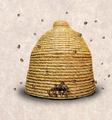| This article is a stub. You can help Chronicles of Elyria by expanding it. |
| Bee | |
|---|---|
| Details | |
Type |
Insect |
Size |
Small |
Diet |
Herbivore |
Biomes |
unknown |
Attitude |
Unknown |
Rarity |
Common, Rare |
| Traits | |
Mount |
No |
Draft |
No |
Pet |
Yes (beehives for farming) |
Abilities |
Create honey, germinate flowers |
Introduction[ | ]
Bees are useful for making honey and wax, and help germinate flowers.[1]
Survival[ | ]
Ref.:[2][3]
Bees increase germination and growth rates of plants in their area. They can live in either natural or man-made beehives. Bees in the wild can be caught and used in man-made beehives and are easiest to catch when swarming. Bees cannot survive extreme cold like in a tundra. The lifespan of bees is about about 6 months in real life, so the average lifespan of bees in COE will be about 3-4 days and it will be necessary to maintain a hive carefully, re-queening if things go poorly. Bees will require flowers to provide pollen, which is used to make honey.
Honey[ | ]
Ref.:[2]
Bees will produce honey in their beehives. There is only one type of honey currently planned.
Uses[ | ]
- Cooking
- Mead
- Salves
Beeswax[ | ]
Beeswax will likely be required for candlemaking, etc.
Breeds[ | ]
Ref.:[2][3]
There are 2 planned types of bees. Due to genetics and difference in biome, however, selective breeding may be able to happen to acquire desired traits. Breeding the same breed will result in no genetic or trait alterations, while breeding different breeds results in hybrids with similar qualities from both. The two types of bees are currently planned:
- Common Bees
- Cardinal Bees [4]
Cardinal Bees[ | ]
These bees are so rare that they are a matter of legend. Like all other bees, they increase germination and growth rates of plants in their area, but the honey of Cardinal bees provides bonuses to healing and vitality when used in foods or potions.[4]
Quality[ | ]
Ref.:[3]
While there are only 2 planned types of bees, there is a range of quality planned for bees, which results in different trait expressions. While the quality of bees found in the wild will vary randomly, the EP Store will have the option to buy hives and give the purchaser information on the quality of the bees. Breeding bees works the same as any other animal / insect. Breeding the same quality of bees will result in no change. Breeding other qualities results in hybrids with similar qualities from both strains. Queen bees are able to create additional queens but this may lead to more swarming which has negative and positive side effects depending on the aggression level of the bees and the region they are in.
Quality of Bees will effect:
- Frequency of Swarming (More/Less Often)
- Honey Quality (Better/Worse)
- Honey Amount (More/Less Produced)
- Wax Quality (Better/Worse)
- Wax Amount (More/Less Produced)
- Hostility and Defensiveness (More/Less Hostile)
- Lifespan (Longer/Shorter Lives)
- etc.
Range[ | ]
Ref.:[5]
The search range of a common bee for nectar is 3 parcels, or 192 meters in any direction. This results in a cube 6 parcels wide, 6 parcels tall, and 6 parcels long. With a range radius of 3 parcels, a bee has a search area of ≈30171.86 meters.
The area and range of search is larger with cardinal bees.
Swarming[ | ]
Swarms occur for a number of reasons. The hive is too full, there are too many queens, etc. The impact of swarming on the surrounding environment may be positive or negative, depending on the region and on the hostility of the bees.
Lore of the Cardinal Bees[ | ]
The legend of the cardinal bees describes a famine, healed by the cardinal bee's touch, which caused food to grow almost instantly.[6]
Excerpt translated from the journal of Olam the Auger:
It was on one such excursion that I came upon an old woman of the forest who shared with me the most complete rendition of the Miracle of the Second Age that I had ever heard. She spoke a difficult dialect of Croçais but her story went like so.
"So long ago, before we even know ourselves and the people fear the giant ones who stalk the world with wrath and magick, there is a great famine. Starvation and misery find its way to all. There are none who don't feel it. Forest is barren. Grassland is fallow. Fruit wither on vine and on branch. Only animal who stay are mad, desperate things who look at us as food.
"This suffering of Mannkind last six and twenty year. The ancient giants toy with us, the land keeps her gift from us, the beasts prey on us. The hunters who dare go out but very few return. The people cannot stay so they begin to wander. Far they walk but still the food to gather and prey to hunt is wanting. Our mothers and fathers who are on this long journey to survive come at last to the Ba'n, the mountain valley. Inside of three peaks it lay, and though its nature also hibernates, the sun is warm on their backs and the mountain passes frigid. They stay for a night. In the morn, a wonder to behold. They valley is set upon by a swarm of bright, red bees so vast that they cannot see the sky and all the valley look to be awash with red snow, buzzing and rolling across all. A miracle, the bees coax from the sleeping flowers their blooms. The petals open in just minutes of their touch. The trees set in that valley, they grow heavy with ripening fruit in time for midday. Bushes, too, bursting with sweet berries and rich nuts. So surprising, this is, that our ancestors can barely believe it. Even the creatures come out of hiding to watch. Then, as friends, the people and beasts feast aside each other until their bellies are full and their minds are drunk in wonder.
"The ruby-color swarm eventually move on, but our people follow. Not only because they hungry, but because of a learning to be done. The bees make a bounty with care and design and the people want to learn it. The great swarm move across the land from north to south and to west and east. Sometimes, the people decide to stay behind and take on the bee's work, gardening and tending their plants. Anything the bees touch seem better and stronger and heartier. Still, many follow and they leave a path for the others to follow with a flower they find in the Ba'n that wake instantly at the bee's kiss. It bloom bright and long to be seen for miles. Any friends who know can find them again with such a clear path marked for them.
"The journey wane and few are left who follow the swarm by the time it come to the ocean shore. The bees keep on east beyond the waves but some clever ones convince a queen to stay. They plant all their poppies on a high cove above the crashing sea so she and her kin stay to tend to them when the others fly off, like a blood-red cloud in sunset. The pilgrims keep the queen and make her happy and she give them honey and teach them more. Soon they can make their own gardens and grow their own foods. This was where the infants of Mann become the people of Elyria. This is how Mannkind spread far and wide, making cities and growing powerful. Because of this, the titans are put to sleep and the gods trouble us no more."
Though previously recorded versions of the story have different details, the core remains always with a migration of our forebearers, a red swarm of insects, and the first recordings of agriculture. When I attempted to share other accounts of the tale, that old woman laughed and laughed. Though I reflected on it as I prepared for sleep, I couldn't come to conclusion on what, precisely, she found so amusing. When I woke in the morning, she and her kin had gone and I could not find a trail to follow.
This legend resulted in a couple of traditions and religious observances:
- Pilgrimage of Renewal: A rite-of-passage journey of self-reflection and spiritual rejuvenation. The distance can vary between a few miles out of town to thousands of leagues following the path of the original trek taken by those who experienced the famine who then followed the bees to the Baien, home to the Cardinal Poppy. During the trek, the most devoted pilgrims will often bring poppies from their home to plant along the way. At the very end, the pilgrimage garb is buried beneath the last poppy. The Pilgrimage is celebrated by most Elyrians.
- Festival of Virtue: Every 50 or so years, the Vitorians celebrate the year by trying to "wake-up" the virtues, one virtue for each month of the Elyrian calendar. It is believed that the excess of people demonstrating that virtue makes it so that the Virtue can't help but to reflect and resonate it's power back through the realm. The festivities are celebrated with revelry and colorful decorations. Monarn is the only Virtue not celebrated with liveliness - the party doesn't stop but is held in silence and with restraint in the month of modesty.
- Laezhen Memorialus: Drasean followers of Al'tifali celebrate life in all its forms: by sowing seeds, cultivating the lands, giving offerings and reverence to wild and tame animals, encouraging new love and offspring in their people, passing down stories, and commemorating notable people or events. For even the least devout, each day begins with a prayer for the blessing of the Two-Fold Queen, and each night ends with a prayer for Her forgiveness. Drasean Al'tifali wish to improve their souls so that when it returns to Her, it is in better condition than when She lent it. As a time to begin new things, many Dras will journey to a place they've never been, learn a new trade, make new friends, or enter into business contracts - all things of which those that benefit the community are preferred.[6]
Gallery[ | ]
See Also[ | ]
References[ | ]
- ↑ Caspian, Chronicles of Elyria: Q&A With Jeromy Walsh - 11/10/2015, 10 November 2015
- ↑ 2.0 2.1 2.2 Soulbound Studios, 12/12/2016 Live Q&A - Biomes, 12 December 2016
- ↑ 3.0 3.1 3.2 Caspian, CoE Discord #soul-chamber "BEES", 5 November 2017
- ↑ 4.0 4.1 Kaizen, Cardinal Beekeeper kit, 12 March 2018
- ↑ Serpentius, CoE Discord tag ##3.18.2019#Bees#, 18 March 2019
- ↑ 6.0 6.1 Serpentius, The Cardinal Miracle of the Second Age, 08 March 2018
| |||||||||||||||||||||||





